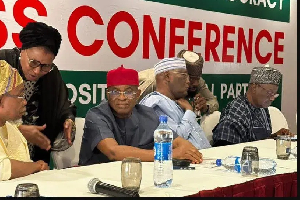The #EndSARS protests in October 2020 captured the state of the nation when defenceless youths on a peaceful protest on Lekki Tollgate were allegedly mowed down with flags in their hands and the national anthem on their lips for daring to demand a better Nigeria.
For many, that day was Nigeria’s darkest hour but for a government that is not used to being held accountable, the killings never happened. Although the protests were primarily directed at the abolition of SARS and the end of police brutality, the demonstrations were essentially a cry for a better and prosperous Nigeria.
The protests simply echoed the frustration of long-suffering Nigerians, tired of the injustice and inequality in society, tired of the worsening state of insecurity in the country, tired of corruption, and tired of an economy seemingly in reverse because of the incompetence of political leadership that has had their knees on the neck of the people for so long.
It is hard to find a socio-economic index where Nigeria is not leading from the rear or in the bottom five per cent, but by far the greatest challenge facing the country today is insecurity. In a country regressing economically, banditry and kidnapping have become the country’s fastest-growing industry and the greatest threat.
Buoyed by their successes, bandits have become more daring, launching attacks and even overrunning police and military establishments, seemingly confident they have the upper hand in a country where crime pays. No one is safe in today’s Nigeria, not even governors with all their security, as Governor Samuel Ortom of Benue State discovered to his horror when on March 20 when he was forced to run for his life from an ambush by suspected Fulani herders. This criminal fraternity of nomads that some say are not even Nigerians have taken over the country’s forests and highways, forcing farming communities to flee and abandon their means of livelihood. For these murderous groups, Nigeria has become a fertile grazing ground for ransom payments
With Internally Displaced Persons camps springing up in different parts of the country, Nigerians have become hostages in their own country because of the inability of the government to protect the lives and property of citizens. Kidnapped victims are having to sell assets they spent a lifetime acquiring to pay ransom to criminals.
In times of adversity, citizens turn to their commander-in-chief for hope and reassurance. Sadly, we have in Aso Rock an unresponsive president who likes to wear the epithet ‘Baba go-slow’ on his sleeves as if it is a virtue; a president who must be pleaded with and cajoled to empathise or even speak to his fellow citizens. Ghana’s President Akufo-Addo has probably done more press interviews in a month than Buhari has done in six years in office. The notion of a leader who works hard in the background and would not speak or go into dialogue with fellow citizens is a fallacy and a contradiction in and of itself.
Critics have noted that whilst the President is quick to mobilise the nation’s arsenal against agitators in the South-East, his response to bandits that have been ravaging the entire country has been lukewarm at best. The Global Terrorism Index has named Fulani militants as one of the deadliest terror groups in the world. Large swathes of Nigerian territory in the North are reportedly under the control of warlords who embark on ethnic cleansing, even levying taxes on ‘conquered’ communities.
Without security, there is very little a country can achieve. The insecurity in Nigeria is having a huge socio-economic impact on the country with over 600 schools reported closed in the north. Statista, one of the world’s leading research organisations, estimates that terrorism has cost Nigeria $142bn since 2007 – nearly 30 times the projected revenue from oil in the 2021 federal budget.
The world needs to pay attention to what is happening in Nigeria. An implosion of Nigeria would have huge consequences for the region. Displaced Nigerians are already fleeing across the border, swelling the IDP camps in Niger, Chad, Cameroon and Benin Republic. The country is under the siege of armed groups on all fronts, who have all calibre of weapons and ready recruits of unemployed youths. In the North-East, there is Boko Haram and its Islamic State offshoot, Islamic State West Africa Province, that have been waging a war against the state since 2009.
In the North-West and the Middle Belt, banditry, ethnic cleansing and mass abductions have become commonplace, with militia gangs waging a guerrilla war against citizens for ransom. In the South, kidnapping and armed robbery are rife with armed groups that incessantly launch brazen attacks on businesses and police establishments. The audacious attack on the police headquarters in Owerri on Easter Monday is troubling and became a precursor of the challenging times ahead for Nigeria. These militants are no doubt exploiting the weakness of public institutions and Nigeria’s corrupt political and socio-economic systems.
As insecurity ravages the land, the call by some for self-determination is getting louder, bolstered by the action and inaction of a Commander-in-Chief critics have described as a Divider-in-Chief. As a country, Nigeria has never been this divided along tribal, religious and regional lines. Where once we had cracks, we now have chasms, under the President, major General Muhammadu Buhari (retd.)’s watch.
With millions of naira exchanging hands daily in ransom payments and no arrests or consequences for criminality, it is hard to see how the country can come out of this quagmire. Our security forces seem overwhelmed by the magnitude of the challenge. The police and the military that were once feared are now targets for gunmen. Ironically, the security challenges facing the country today is a product of many years of poor governance and mismanagement of the nation’s resources. The resources that would have been used to develop the country and create jobs for the masses were arrogated by a few, leaving the rest of the population to forage for crumbs falling from their tables. The chicken, it would seem, has come home to roost.
Addressing the current state of insecurity in Nigeria would require leadership. It would require a radical reform of Nigeria’s entire security apparatus, including the pay and conditions of the police.
It would require the urgent establishment of state police services that are adequately trained and resourced, made up of locals; it would require lots of boots on the ground to overwhelm the enemy; it would require addressing the legitimate concerns of large sections of the population that feel marginalised and without a stake in the Nigerian project. More importantly, it would require addressing the high level of youth unemployment in the country.
The solution is not in doling out cash handouts to young people who can work, but in creating real jobs through investment in infrastructure projects. Until the problem of hunger and unemployment are addressed in Nigeria, security is bound to get worse. The collective leadership of the country must start taking the growing insecurity in the country very seriously. It is in their own best interest. The urgency is now.
Opinions of Wednesday, 19 May 2021
Columnist: Nwachukwu















